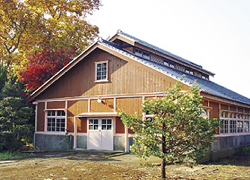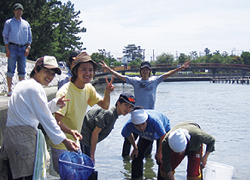Overview

The most vital factor required to sustain human life is food. According to estimates published by the United Nations, the world’s population will reach 9.8 billion people in 2050, resulting in an increase of approximately 1.3 times the current population size. Even today, millions of people in the world do not have access to enough food. This situation is expected to grow increasingly dire with time.
To alleviate this situation, an increase in the production of foodstuffs is imperative. Agriculture as an academic discipline promotes research that works to solve this problem from a wide range of angles. Some of the ways in which agriculture strives to improve the quality and quantity of food include: raising the efficiency of plants’ solar energy usage by increasing the rate of photosynthesis; developing crops that are highly resistant to disease and insect damage; modifying soil not suited for growing plants so that it may be used to raise crops; increasing the efficiency of farming aquatic animals such as fish; developing techniques to prevent infectious diseases from spreading among livestock; and proposing policies from the standpoint of agricultural economics.
In recent years, many people throughout the world have been calling for conservation of the Earth’s environment. The advancement of industrial society has been accompanied by a soaring demand for energy, and a variety of oil-based products available now has greatly enriched our society. However, the increase in carbon dioxide, which is a byproduct of the fossil fuels used to support this standard of living, accelerates climate change. Faced with a grim future, people throughout the world have started utilizing their knowledge and making the utmost effort to stop this phenomenon from progressing. Nevertheless, as the world’s population grows, the demand for energy will also grow, leading to a further increase in carbon dioxide emissions. There are even concerns that an increase in food production will worsen the environment and cause a decrease in the diversity of living things.
To alleviate this situation, an increase in the production of foodstuffs is imperative. Agriculture as an academic discipline promotes research that works to solve this problem from a wide range of angles. Some of the ways in which agriculture strives to improve the quality and quantity of food include: raising the efficiency of plants’ solar energy usage by increasing the rate of photosynthesis; developing crops that are highly resistant to disease and insect damage; modifying soil not suited for growing plants so that it may be used to raise crops; increasing the efficiency of farming aquatic animals such as fish; developing techniques to prevent infectious diseases from spreading among livestock; and proposing policies from the standpoint of agricultural economics.
In recent years, many people throughout the world have been calling for conservation of the Earth’s environment. The advancement of industrial society has been accompanied by a soaring demand for energy, and a variety of oil-based products available now has greatly enriched our society. However, the increase in carbon dioxide, which is a byproduct of the fossil fuels used to support this standard of living, accelerates climate change. Faced with a grim future, people throughout the world have started utilizing their knowledge and making the utmost effort to stop this phenomenon from progressing. Nevertheless, as the world’s population grows, the demand for energy will also grow, leading to a further increase in carbon dioxide emissions. There are even concerns that an increase in food production will worsen the environment and cause a decrease in the diversity of living things.

Active research is also being done on the biotic communities and individual organisms that form ecosystems. With a deep understanding of the growth mechanisms of plants and animals, we can increase the numbers of these plants and animals. Through researching the reproductive mechanisms of living things, we can improve their reproduction rates and efficiency. Finally, by studying the interactions between living things, such as those between plants and insects, plants and microorganisms, microorganisms and insects, and microorganisms and other microorganisms, we can construct a more multifaceted biological production system. The more we make progress with our research, the more we are overcome by the mysteriousness of living things. Understanding these mysterious functions and linking them to areas where they can be put to use is a vital objective of agricultural science. Living organisms are so complex, they cannot be explained simply by physics or chemistry. Investigating this complexity is the essence of the study of agriculture.
Agriculture is a comprehensive science with research that covers a wide range of fields. Some of the research is conducted in scientific areas, such as studies on restoring natural environments; analyzing the behavior of wild animals; conservation and usage of forests; the scientific aspects involved with housing and shelter; usage of water resources; soil sciences; the development of medicinal resources; sciences concerned with the security and safety of food; techniques for processing and preserving food products; research on the functionality of food items; and putting microorganisms to use in foods and the environment. Other research is carried out in the spectrum of the humanities, including business management, economics, history and culture of the agricultural, forestry, fishing and livestock sectors.
Agricultural science is constantly evolving. In recent years, the field of agriculture is becoming highly specialized. The objective of the Faculty of Agriculture is not just to train students to work in agricultural industries, but also to equip students with the basic knowledge of agriculture and foster within them a global perspective that enables them to flourish in any environment.
Agriculture is a comprehensive science with research that covers a wide range of fields. Some of the research is conducted in scientific areas, such as studies on restoring natural environments; analyzing the behavior of wild animals; conservation and usage of forests; the scientific aspects involved with housing and shelter; usage of water resources; soil sciences; the development of medicinal resources; sciences concerned with the security and safety of food; techniques for processing and preserving food products; research on the functionality of food items; and putting microorganisms to use in foods and the environment. Other research is carried out in the spectrum of the humanities, including business management, economics, history and culture of the agricultural, forestry, fishing and livestock sectors.
Agricultural science is constantly evolving. In recent years, the field of agriculture is becoming highly specialized. The objective of the Faculty of Agriculture is not just to train students to work in agricultural industries, but also to equip students with the basic knowledge of agriculture and foster within them a global perspective that enables them to flourish in any environment.
Courses and Majors
Applied Life Sciences Course

Major in Biological Chemistry and Biotechnology
Major in Applied Biology
Major in Forest Life Science
Major in Aquatic Life Sciences
Major in Animal Life Sciences
Major in Bio-based Materials Chemistry
Major in Applied Biology
Major in Forest Life Science
Major in Aquatic Life Sciences
Major in Animal Life Sciences
Major in Bio-based Materials Chemistry
Environmental and Resource Sciences Course
Major in Landscape Ecology and Planning
Major in Forest Environmental and Resource Science
Major in Aquatic Production and Environmental Science
Major in Wood Science and Timber Engineering
Major in Biological and Environmental Engineering
Major in Agricultural and Resource Economics
Major in Field Science
Major in International Sustainable Agriculture Development
Major in Forest Environmental and Resource Science
Major in Aquatic Production and Environmental Science
Major in Wood Science and Timber Engineering
Major in Biological and Environmental Engineering
Major in Agricultural and Resource Economics
Major in Field Science
Major in International Sustainable Agriculture Development
Veterinary Medical Sciences Course

Major in Veterinary Medical Sciences
Types of Degrees
Applied Life Sciences Course, Environmental and Resource Sciences Course: Bachelor of Agriculture
Veterinary Medical Sciences Course: Bachelor of Veterinary Medicine
Veterinary Medical Sciences Course: Bachelor of Veterinary Medicine
Contact
Student Support Team (Undergraduate Students): gakubu.a AT gs.mail.u-tokyo.ac.jp
Office for International Cooperation and Exchange: oice.a AT gs.mail.u-tokyo.ac.jp
International Students Support Team: ryugaku.a AT gs.mail.u-tokyo.ac.jp
Office for International Cooperation and Exchange: oice.a AT gs.mail.u-tokyo.ac.jp
International Students Support Team: ryugaku.a AT gs.mail.u-tokyo.ac.jp







